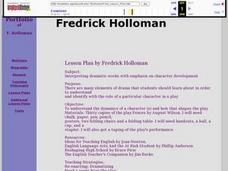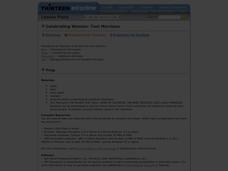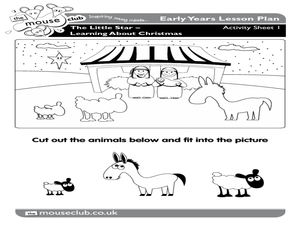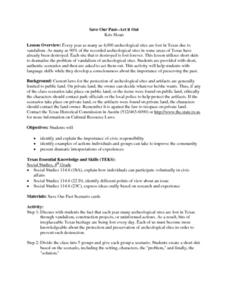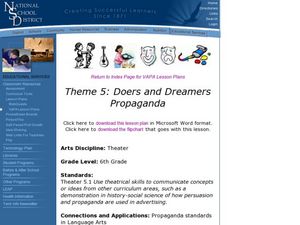Teaching Tolerance
Act Up! Drama for Justice
A lesson turns young historians into playwrights to understand and speak out against social injustice. Pupils work individually or in groups to write and perform monologues that deliver personal messages on social justice. Writers then...
Curated OER
Active Viewing: Savage Acts
Based on the documentary film Savage Acts: Wars, Fairs, and Empire, this lesson explores concepts of National interests and imperialism. They view sections of the film and share which images exemplify the meaning of each vocabulary term....
Curated OER
Diary of Anne Frank: Act 1 Scene 1 & 2
Eighth graders read act 1 scenes 1 & 2 of the play Diary of Anne Frank. In this Diary of Anne Frank lesson plan, 8th graders discuss how the setting of the play affects the mood of the story and answer short answer questions.
Curated OER
Interpreting Dramatic Works
Action! Delve into character development in the play Fences by August Wilson, setting the stage for learners to analyze character nuances. Thespians choose a scene from the script, responding with a written account of the...
Curated OER
A New Life, a New Home
Students connect with an immigration unit through research, journal writing, digital photography, and a movie production using iMovie. By acting out the immigrant's experience, students gain a deeper understanding and appreciation of...
Curated OER
"Whose (Is)land is This?": topics in Immigration and The Tempest
Class members compare the ways the subject of immigration is treated in The Tempest, Act I, scene ii, Act II, scene i and Act III, scene ii with patterns in American history. After tracing their own family’s journey, a series of...
Curated OER
Celebrating Women: Toni Morrison
How authors address issues of their societies is addressed in this very detailed instructional activity. After researching Toni Morrison and her work, groups create a dramatization based on a scene from one of Morrison’s novels and act...
San Francisco Symphony
Going West
Now this sounds like a fun lesson! Youngsters learn about pioneer life and the Westward Movement. First, they listen to the Copland's "Appalachian Spring," and then they discuss the elements of music found in the piece. They...
Curated OER
The Little Star: Learning About Christmas
Students listen to the story, discuss how Christmas is celebrated, and construct a nativity scene. In The Little Star lesson, students hear the story showing Christmas as a religious festival. Students act out the story and...
Curated OER
C¿¿sar Ch¿¿vez, Organizes the Farm Workers Association - Act I, Scene I "The House Meeting"
Eleventh graders analyze the development of federal civil and voting rights for minority groups. In groups, they discuss how Cesar Chavez organized the farm workers and the techniques he used when protesting. They define and practice...
Curated OER
Save Our Past -- Act It Out
Fourth graders identify and examine the importance of civic responsibility and the result of losing many archeological sites in Texas. In groups, they are given scenerio cards and act out each scene for the class. They also write a...
Curated OER
Purim, Esther, and Bella Abzug: Wearing Costumes and Choosing Roles
Explore the story of Bella Abzug and her role as a 1940s office worker. Collaborative learners work in groups to tell the biblical story of Esther and add details as each member participates. Comparing and contrasting the roles of Esther...
BBC
Conflict
Middle schoolers take a close look at the different forms that bullying can take, and share their ideas of ways to stop bullying in schools. Learners get together in groups of three and come up with a scenario that depicts a...
Curated OER
Let's Discover Communities
Second graders compare and contrast the city and the country. After reading books about animals, 2nd graders create picture cards of animals in both the country and city environment. In partners, students draw pictures of animals,...
Curated OER
Theme 5: Doers and Dreamers Propaganda
Seventh graders create and perform one act scenes that use the strategies of advertising. in this propaganda study lesson, 7th graders watch a commercial and are assigned a propaganda strategy. Students plan a scene that illustrates the...
Curated OER
Co-Operation: Drama
For some schools, character-counts lessons are a big part of the curriculum. This resource focuses on following directions and the importance of being a cooperative team player. Learners role-play a variety of situations by being...
Curated OER
Prehistoric Charades
Fourth graders role play situations representing different eras of prehistoric people. They create the role play scenes and design a mural depicting scenes from each prehistoric group.
Curated OER
Investigation of Immigration
Students assume the role of a crime scene detective and examine the lives of various immigrant groups. In this immigration lesson, students examine evidence, websites, and pull from existing knowledge to determine which group they are...
Curated OER
Romans in Britain, or Classical Colonialism
Students identify the extent of the Roman Empire on a map of Europe and North Africa. They discuss the reasons behind Roman expansion and occupation. They read Cymbeline and write about the attitudes of 3 characters. Groups stage the scene.
Curated OER
Who's Who in Roman History
Students, in groups, produce a classroom documentary about important historical figures from the Roman Empire. They create posters to be part of a classroom timeline showing when each of these people lived and their impact on the empire.
Curated OER
Friendship in Julius Caesar
Students examine the vocabulary used to show friendship in Shakespeare's, Julius Caesar. For this Julius Caesar lesson, students discuss their idea of friendship and what it means to them. They work in pairs to determine how same sex...
Curated OER
Reality Check
Students evaluate different types of reality television programming in "focus groups" and then submit their opinions on this type of programming to a television network.
Curated OER
The Reichstag Fire
Students examine the implications of the burning of the Reichstag in 1933. Using the Weimer Constitution as a guide, they identify issues that allowed for Hitler and the Nazi party to gain power. In groups, they create a web of the...



